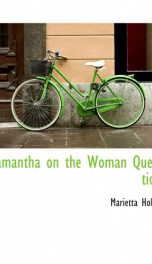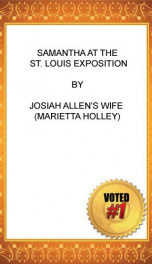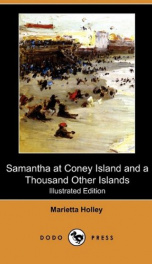Holley Marietta

Marietta Holley (1836-1926), was an American humorist who used satire to comment on U.S. society and politics. Her successful series of "Samantha" books feature the character of Samantha Allen, a wise small-town woman, or "crackerbox philosopher," who goes on adventures in urban America and Europe, and her foolish husband, Josiah Allen. Holley was so skilled with satire and so popular that she was often compared to Mark Twain and Edgar Nye. Holley was born on July 16, 1836 to John Milton and Mary Tabor Holley, the youngest of seven children. They lived on a small farm in the town of Bear Creek, now called Pierrepont Manor. At the age of 14, she ended her formal education to help support her family by giving piano lessons. When she was 17, she converted to Baptism and joined the Adams Village Baptist Church. Her father died when she was 25, and Holley took charge of the farm and care of her sick mother and sister. After she became successful as a writer, she built a Mansion called "Bonnie View" near her family's home in Pierrepont. Holley never married. She died on March 1, 1926 at the age of 89. Holley enjoyed a prolific writing career, and was a bestselling author in the late 19th-century, though she was widely forgotten by the time of her death. Her first poems were published locally in the Adams Journal, which lead to later successes in more prominent periodicals, such as Peterson's Magazine. In 1872, her first novel, My Opinions and Betsey Bobbet's, was released by the American Publishing Company. Her most popular novel was probably Samantha at Saratoga, though sales statistics for this period are unreliable. Holley was known to be shy, and spent most of her life close to her family's farm, often writing her novels using maps and travel guides as resources. Despite her fear of travel, she did visit New York City periodically in her later life. She was well regarded by many contemporary writers and suffragists. Her famous friends included Susan B. Anthony, Twain and Clara Barton. Anthony frequently asked Holley to give speeches at suffrage conventions due to the strong stand Holley took in support of women's suffrage, though Holley refused public appearances. Holley is remembered as one of America's most significant early women humorists, along with Frances Miriam Whitcher and Ann S. Stephens.
do you like this author?
What readers are saying
What do you think? Write your own comment on this book!
write a commentWhat readers are saying
What do you think? Write your own comment on this author!
write a commentBook list

Samantha at Coney Islandand a Thousand Other Islands
Series:
Unknown
Year:
Unknown
Raiting:
4.5/5
Show more
add to favoritesadd In favorites

samantha among the colored folks my ideas on the race problem
Series:
Unknown
Year:
Unknown
Raiting:
4.5/5
Show more
add to favoritesadd In favorites

my wayward pardner or my trials with josiah america the widow bump and etce
Series:
Unknown
Year:
Unknown
Raiting:
2.5/5
Show more
add to favoritesadd In favorites
Book list

Samantha at Coney Islandand a Thousand Other Islands
Series:
Unknown
Year:
Unknown
Raiting:
4.5/5
Show more
add to favoritesadd In favorites

samantha among the colored folks my ideas on the race problem
Series:
Unknown
Year:
Unknown
Raiting:
4.5/5
Show more
add to favoritesadd In favorites

my wayward pardner or my trials with josiah america the widow bump and etce
Series:
Unknown
Year:
Unknown
Raiting:
2.5/5
Show more
add to favoritesadd In favorites

my opinions and betsy bobbets designed as a beacon light to guide women to li
Series:
Unknown
Year:
Unknown
Raiting:
4/5
Show more
add to favoritesadd In favorites

my opinions and betsey bobbets designed as a beacon light to guide women to l
Series:
Unknown
Year:
Unknown
Raiting:
2.5/5
Show more
add to favoritesadd In favorites

my opinions and betsey bobbets designed as a beacon light to guide women to
Series:
Unknown
Year:
Unknown
Raiting:
5/5
But Which May Be Read By Members Of The Sterner Sect, Without Injury To Themselves Or The Book.
Show more
add to favoritesadd In favorites

Samantha on the Woman Question
Series:
Unknown
Year:
Unknown
Raiting:
4.5/5
Marietta Holley (1836-1926) was a popular United States humorist who used satire to comment on U. S. society and politics. She was the youngest of seven children and was an unhealthly child. This caused her to become a private person. At the age of 14 she stopped her formal education to help her family on their farm. After her father died she took care of the farm and her sick mother and sister. When she was 17 she joined the Adams village Baptist Church. There she found her voice. In 1860 she sent her poetry to the Adams Journal. Her successful series of Samantha books revolved around the character of Samantha Allen, a wise small-town woman who went on satirical adventures throughout big-city America, and her foolish husband, Josiah Allen. Holley was so skilled with satire and so popular that she was often compared to Mark Twain. Her works include: My Opinions and Betsy Bobbet's (1873), Poems (1887), Samantha at the World's Fair (1893) and Samantha on the Woman Question (1913). --This text refers to an alternate Paperback edition.
Show more
add to favoritesadd In favorites

Samantha at the St. Louis Exposition
Series:
Unknown
Year:
Unknown
Raiting:
4.5/5
excerpt from the book...I had noticed for some time that Josiah Allen had acted queer. He wouldseem lost in thought anon or oftener, and then seemin'ly roust himselfup and try to act natural.And anon he would drag his old tin chest out from under the backstairway and pour over musty old deeds and papers, drawed up by hisgreat-grandpa mebby.He did this last act so often that I said to him one day, "What underthe sun do you find in them yeller old papers to attract you so,Josiah?"But he looked queer at me, queer as a dog, as if he wuz lookin' throughme to some distant view that interested him dretfully, and answeredevasive, and mebby he wouldn't answer at all.
Show more
add to favoritesadd In favorites

Samantha at Coney Island
Series:
Unknown
Year:
Unknown
Raiting:
3.5/5
Marietta Holley (1836-1926) was a popular American humorist who used satire to comment on U. S. society and politics. She was the youngest of seven children and was an unhealthly child. This caused her to become a private person. At the age of 14 she stopped her formal education to help her family on their farm. After her father died she took care of the farm and her sick mother and sister. When she was 17 she joined the Adams village Baptist Church. There she found her voice. In 1860 she sent her poetry to the Adams Journal. Her successful series of Samantha books revolved around the character of Samantha Allen, a wise small-town woman who went on satirical adventures throughout big-city America, and her foolish husband, Josiah Allen. Holley was so skilled with satire and so popular that she was often compared to Mark Twain. Her works include: My Opinions and Betsy Bobbet's (1873), Poems (1887), Samantha at the World's Fair (1893) and Samantha on the Woman Question (1913).
Show more
add to favoritesadd In favorites
What readers are saying
What do you think? Write your own comment on this author!
write a commentif you like Holley Marietta try:
readers also enjoyed
What readers are saying
What do you think? Write your own comment on this author!
write a commentGenre
if you like Holley Marietta try:
readers also enjoyed
Do you want to exchange books? It’s EASY!
Get registered and find other users who want to give their favourite books to good hands!

